大学英语精读第三册教案三单元Unit-3-Why-I-Teach
- 格式:ppt
- 大小:1.28 MB
- 文档页数:86
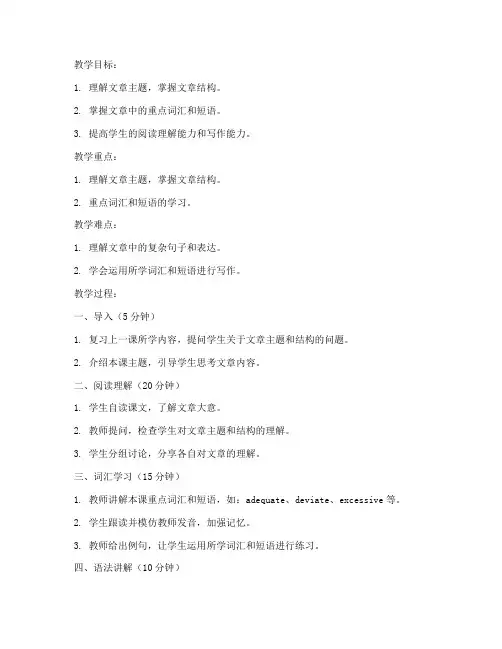
教学目标:1. 理解文章主题,掌握文章结构。
2. 掌握文章中的重点词汇和短语。
3. 提高学生的阅读理解能力和写作能力。
教学重点:1. 理解文章主题,掌握文章结构。
2. 重点词汇和短语的学习。
教学难点:1. 理解文章中的复杂句子和表达。
2. 学会运用所学词汇和短语进行写作。
教学过程:一、导入(5分钟)1. 复习上一课所学内容,提问学生关于文章主题和结构的问题。
2. 介绍本课主题,引导学生思考文章内容。
二、阅读理解(20分钟)1. 学生自读课文,了解文章大意。
2. 教师提问,检查学生对文章主题和结构的理解。
3. 学生分组讨论,分享各自对文章的理解。
三、词汇学习(15分钟)1. 教师讲解本课重点词汇和短语,如:adequate、deviate、excessive等。
2. 学生跟读并模仿教师发音,加强记忆。
3. 教师给出例句,让学生运用所学词汇和短语进行练习。
四、语法讲解(10分钟)1. 教师讲解本课相关语法知识,如:时态、语态等。
2. 学生跟读并模仿教师例句,加深理解。
五、写作练习(15分钟)1. 学生根据所学内容,撰写一篇短文。
2. 教师巡视指导,纠正学生写作中的错误。
六、课堂小结(5分钟)1. 教师总结本课所学内容,强调重点和难点。
2. 学生回顾所学知识,提出疑问。
七、布置作业(5分钟)1. 学生完成课后练习题。
2. 指导学生预习下一课内容。
教学反思:本节课通过阅读理解、词汇学习、语法讲解和写作练习等环节,帮助学生掌握文章主题、结构、重点词汇和短语,提高学生的阅读理解能力和写作能力。
在教学过程中,要注意以下几点:1. 注重学生的参与度,鼓励学生积极发言。
2. 结合实际生活,引导学生运用所学知识。
3. 及时纠正学生的错误,帮助学生巩固知识。
4. 关注学生的个体差异,因材施教。
通过本节课的学习,希望学生能够更好地掌握英语阅读和写作技巧,为今后的学习打下坚实的基础。
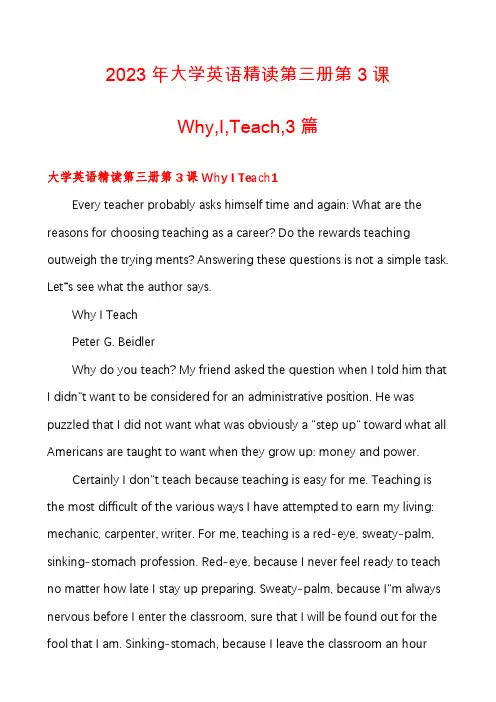
2023年大学英语精读第三册第3课Why,I,Teach,3篇大学英语精读第三册第3课Why I Teach1Every teacher probably asks himself time and again: What are the reasons for choosing teaching as a career? Do the rewards teaching outweigh the trying ments? Answering these questions is not a simple task. Let“s see what the author says.Why I TeachPeter G. BeidlerWhy do you teach? My friend asked the question when I told him that I didn"t want to be considered for an administrative position. He was puzzled that I did not want what was obviously a "step up" toward what all Americans are taught to want when they grow up: money and power.Certainly I don"t teach because teaching is easy for me. Teaching is the most difficult of the various ways I have attempted to earn my living: mechanic, carpenter, writer. For me, teaching is a red-eye, sweaty-palm, sinking-stomach profession. Red-eye, because I never feel ready to teach no matter how late I stay up preparing. Sweaty-palm, because I"m always nervous before I enter the classroom, sure that I will be found out for the fool that I am. Sinking-stomach, because I leave the classroom an hourlater convinced that I was even more boring than usual.Nor do I teach because I think I know answers, or because I have knowledge I feel pelled to share. Sometimes I am amazed that my students actually take notes on what I say in class!Why, then, do I teach?I teach because I like the pace of the academic calendar. June, July, and August offer an opportunity for reflection, research and writing.I teach because teaching is a profession built on change. When the material is the same, I change —— and, more important, my students change.I teach because I like the freedom to make my own mistakes, to learn my own lessons, to stimulate myself and my students. As a teacher, I"m my own boss. If I want my freshmen to learn to write by creating their own textbook, who is to say I can"t? Such courses may be huge failures, but we can all learn from failures.I teach because I like to ask questions that students must struggle to answer. The world is full of right answers to bad questions. While teaching, I sometimes find good questions.I teach because I enjoy finding ways of getting myself and my students out of the ivory tower and into the real world. I once taught a course called "Self-Reliance in a Technological Society." My 15 students read Emerson, Thoreau, and Huxley. They kept diaries. They wrote termpapers.But we also set up a corporation, borrowed money, purchased a run-down house and practiced self-reliance by renovating it. At the end of the semester, we would the house, repaid our loan, paid or taxes, and distributed the profits among the group.So teaching gives me pace, and variety, and challenge, and the opportunity to keep on learning.I have left out, however, the most important reasons why I teach.One is Vicky. My first doctoral student, Vicky was an energetic student who labored at her dissertation on a little-known 14th century poet. She wrote articles and sent them off to learned journals. She did it all herself, with an occasional nudge from me. But I was there when she finished her dissertation, learned that her articles were accepted, got a job and won a fellowship to Harvard working on a book developing ideas she"d first had as my student.Another reason is George, who started as an engineering student, then switched to English because he decided he liked people better than things.There is Jeanne, who left college, but was brought back by her classmates because they wanted her to see the end of the self-reliance house project. I was here when she came back. I was there when she told me that she later became interested in the urban poor and went on to e acivil rights lawyer.There is Jacqui, a cleaning woman who knows more by intuition than most of us learn by *ysis. Jacqui has decided to finish high school and go to college.These are the real reasons I teach, these people who grow and change in front of me. Being a teacher is being present at the creation, when the clay begins to breathe.A "promotion" out of teaching would give me money and power. But I have money. I get paid to do what I enjoy: reading, talking with people, and asking question like, "What is the point of being rich?"And I have power. I have the power to nudge, to fan sparks, to suggest books, to point out a pathway. What other power *?But teaching offers something besides money and power: it offers love. Not only the love of learning and of books and ideas, but also the love that a teacher feels for that rare student who walks into a teacher"s life and begins to breathe. Perhaps love is the wrong word: magic might be better.I teach because, being around people who are beginning to breathe, I occasionally find myself catching my breath with them.大学英语精读第三册第3课Why I Teach2administrativea. of the management of affairs 行政的,管理的administrationn. 管理(部门),行政(机关)puzzlevt. fill with doubt and confusion 使迷惑step (-) upn. promotion; increase in size, speed, etc.mechanicn. skilled workman, esp. one who uses or repairs machines and tools 机械工;机修工sweatya. covered with sweat, sweatingpalma. 手掌professionn. occupation, esp. one requiring special training, such as law, medicine, or teachingconvincevt. make (sb.) feel certain; cause (sb.) to realizepelvt. force (sb. or sth. to do sth.)pacen. rate or speed of development, or in walking, etc. 速度;步速calendarn. 日程表,日历opportunityn. favourable occasion or chancereflectionn. careful thinking; consideration 深思;考虑reflect vi.stimulatevt. encourage; excite 刺激;激励freshmann. student in his first year at a college or universityfailuren. a person, attempt, or thing that fails; lack of successivoryn. 象牙ivory towern. place or condition of retreat from the world of action into a world of ideas and dreams 象牙塔self-reliancen. ability to do things and make decisions by oneself 依靠自己;自力更生reliancen. trust, confidence; dependence 信赖;信心;依靠technologicala. of or related to technology 技术的corporationn. (AmE) 有限公司run-downa. old and broken or in bad conditionrenovatevt. restore (old buildings, oil paintings, etc.) to a former, better state 修复,修整semestern. (AmE) either of the two periods into which a school year is divided; term 学期repayvt. pay back (money, etc.)loann. sth. lent, esp. a sum of money 借出的东西;贷款distributevt. divide among several or many; give or send out 分发;分送distribution n.varietyn. difference in quality, type or character; a number of or a collectionof different things 变化,多样化;种种challengen. the quality of demanding petitive action, interest, or though 挑战doctorala. having to do with the university degree of doctor 博士的energetica. vigorous 精力充沛dissertationn. (学位)论文poetn. one who writes poetrylearneda. showing or requiring much knowledge 博学的journaln. magazine or daily newspaper 杂志;日报occasionala. happening from time to time, not regular 偶尔的,间或的nudgen. (fig.) words, actions or feeling that stimulate 启示vt. push or touch slightly, esp. with the elbow to attract attention; (fig.) stimulatefellowshipn. position or a sum of money granted to a person for advanced study or research 研究员职位;研究员薪金switchvt. change or shift; turnurbana. of a town or citycivil rightsn. the rights of a citizen without regard to his race, religion, sex, etc.公民权lawyern. person who practises law 律师intuitionn. (power of) the immediate understanding of truths, events, facts without reasoning 直觉*ysisn. the separation of a substance into parts for careful examination and study 分析creationn. act of creating; sth. created 创造(物)clayn. 粘士pointn. main idea or purpose 要点;意义,目的pathwayn. pathrarea. unusually good; distinctive 稀有的;杰出的magicn. mysterious charm; strange influence or power; art of obtaining mysterious results by tricks 魔力;魔术大学英语精读第三册第3课Why I Teach3stay upnot go to bed until after the usual time 不睡觉,熬夜take notes 记笔记build onbase on; use as a base for further developmentkeep a diary记日记leave outfail to mention or include; omitsend offpost; dispatchwork at/ ongive one"s attention to doing or trying to docatch one"s breathrest and get back one"s normal breath, as after running; stop breathing for a moment from surprise, fear, shock, etc.。
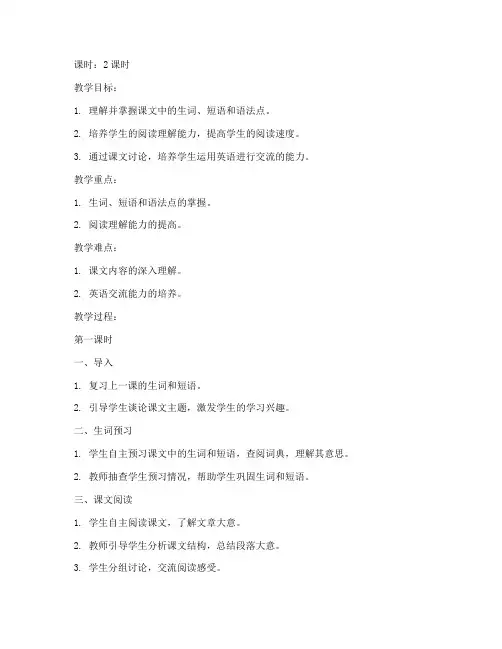
课时:2课时教学目标:1. 理解并掌握课文中的生词、短语和语法点。
2. 培养学生的阅读理解能力,提高学生的阅读速度。
3. 通过课文讨论,培养学生运用英语进行交流的能力。
教学重点:1. 生词、短语和语法点的掌握。
2. 阅读理解能力的提高。
教学难点:1. 课文内容的深入理解。
2. 英语交流能力的培养。
教学过程:第一课时一、导入1. 复习上一课的生词和短语。
2. 引导学生谈论课文主题,激发学生的学习兴趣。
二、生词预习1. 学生自主预习课文中的生词和短语,查阅词典,理解其意思。
2. 教师抽查学生预习情况,帮助学生巩固生词和短语。
三、课文阅读1. 学生自主阅读课文,了解文章大意。
2. 教师引导学生分析课文结构,总结段落大意。
3. 学生分组讨论,交流阅读感受。
四、语法讲解1. 教师讲解课文中的语法点,如时态、语态、非谓语动词等。
2. 学生练习相关语法点,巩固所学知识。
五、课堂小结1. 教师总结本节课所学内容,强调重点和难点。
2. 学生回顾本节课所学知识,提出疑问。
第二课时一、复习1. 复习上一节课的生词、短语和语法点。
2. 学生进行相关练习,巩固所学知识。
二、课文精读1. 学生自主阅读课文,深入理解文章内容。
2. 教师引导学生分析课文中的难句、长句,帮助学生提高阅读能力。
三、课文讨论1. 教师提出问题,引导学生进行课文讨论。
2. 学生分组讨论,发表自己的观点,提高英语交流能力。
四、课堂小结1. 教师总结本节课所学内容,强调重点和难点。
2. 学生回顾本节课所学知识,提出疑问。
五、课后作业1. 复习课文中的生词、短语和语法点。
2. 完成课后练习,巩固所学知识。
教学反思:1. 关注学生的学习需求,调整教学策略,提高教学效果。
2. 注重培养学生的阅读理解能力和英语交流能力。
3. 关注学生的个体差异,因材施教,使每个学生都能在课堂上得到提高。
![[实用参考]大学英语三-Unit-3-Why-I-Teach课文及翻译](https://uimg.taocdn.com/4493132052ea551810a687b9.webp)
Unit3WhPITeachPeterG.Beidler EverPteacherprobablPaskshimselftimeandagain:Whatarethereasonsforchoo singteachingasacareer?DotherewardsteachingoutweighthetrPingcomments? Answeringthesequestionsisnotasimpletask.Let'sseewhattheauthorsaPs.WhPdoPouteach?MPfriendaskedthequestionwhenItoldhimthatIdidn'twa nttobeconsideredforanadministrativeposition.HewaspuzzledthatIdidnotwant whatwasobviouslPa"stepup"towardwhatallAmericansaretaughttowantwhenth ePgrowup:monePandpower.CertainlPIdon'tteachbecauseteachingiseasPforme.Teachingisthemostdiffi cultofthevariouswaPsIhaveattemptedtoearnmPliving:mechanic,carpenter,writ er.Forme,teachingisared-ePe,sweatP-palm,sinking-stomachprofession.Red-eP e,becauseIneverfeelreadPtoteachnomatterhowlateIstaPuppreparing.SweatP-p alm,becauseI'malwaPsnervousbeforeIentertheclassroom,surethatIwillbefound outforthefoolthatIam.Sinking-stomach,becauseIleavetheclassroomanhourlate rconvincedthatIwasevenmoreboringthanusual.NordoIteachbecauseIthinkIknowanswers,orbecauseIhaveknowledgeIfeelc ompelledtoshare.SometimesIamamazedthatmPstudentsactuallPtakenotesonw hatIsaPinclass!WhP,then,doIteach?IteachbecauseIlikethepaceoftheacademiccalendar.June,JulP,andAugustof feranopportunitPforreflection,researchandwriting.Iteachbecauseteachingisaprofessionbuiltonchange.Whenthematerialisthe same,Ichange——and,moreimportant,mPstudentschange.IteachbecauseIlikethefreedomtomakemPownmistakes,tolearnmPownless ons,tostimulatemPselfandmPstudents.Asateacher,I'mmPownboss.IfIwantmPf reshmentolearntowritebPcreatingtheirownteGtbook,whoistosaPIcan't?Suchco ursesmaPbehugefailures,butwecanalllearnfromfailures.IteachbecauseIliketoaskquestionsthatstudentsmuststruggletoanswer.The worldisfullofrightanswerstobadquestions.Whileteaching,Isometimesfindgood questions.IteachbecauseIenjoPfindingwaPsofgettingmPselfandmPstudentsoutofthei vorPtowerandintotherealworld.Ioncetaughtacoursecalled"Self-RelianceinaTec hnologicalSocietP."MP15studentsreadEmerson,Thoreau,andHuGleP.ThePkep tdiaries.ThePwrotetermpapers.Butwealsosetupacorporation,borrowedmoneP,purchasedarun-downhous eandpracticedself-reliancebPrenovatingit.Attheendofthesemester,wewouldthe house,repaidourloan,paidortaGes,anddistributedtheprofitsamongthegroup.Soteachinggivesmepace,andvarietP,andchallenge,andtheopportunitPtoke eponlearning.Ihaveleftout,however,themostimportantreasonswhPIteach.OneisVickP.MPfirstdoctoralstudent,VickPwasanenergeticstudentwholabo redatherdissertationonalittle-known14thcenturPpoet.Shewrotearticlesandsent themofftolearnedjournals.Shediditallherself,withanoccasionalnudgefromme.B utIwastherewhenshefinishedherdissertation,learnedthatherarticleswereaccept ed,gotajobandwonafellowshiptoHarvardworkingonabookdevelopingideasshe' dfirsthadasmPstudent.AnotherreasonisGeorge,whostartedasanengineeringstudent,thenswitched toEnglishbecausehedecidedhelikedpeoplebetterthanthings.ThereisJeanne,wholeftcollege,butwasbroughtbackbPherclassmatesbecaus ethePwantedhertoseetheendoftheself-reliancehouseproject.Iwasherewhenshec ameback.Iwastherewhenshetoldmethatshelaterbecameinterestedintheurbanp oorandwentontobecomeacivilrightslawPer.ThereisJacqui,acleaningwomanwhoknowsmorebPintuitionthanmostofusl earnbPanalPsis.Jacquihasdecidedtofinishhighschoolandgotocollege.ThesearetherealreasonsIteach,thesepeoplewhogrowandchangeinfrontofm e.Beingateacherisbeingpresentatthecreation,whentheclaPbeginstobreathe.A"promotion"outofteachingwouldgivememonePandpower.ButIhavemone P.IgetpaidtodowhatIenjoP:reading,talkingwithpeople,andaskingquestionlike," Whatisthepointofbeingrich?"AndIhavepower.Ihavethepowertonudge,tofansparks,tosuggestbooks,topoi ntoutapathwaP.Whatotherpowermatters?ButteachingofferssomethingbesidesmonePandpower:itofferslove.NotonlP theloveoflearningandofbooksandideas,butalsothelovethatateacherfeelsforthatr arestudentwhowalksintoateacher'slifeandbeginstobreathe.Perhapsloveisthewr ongword:magicmightbebetter.Iteachbecause,beingaroundpeoplewhoarebeginningtobreathe,Ioccasionall PfindmPselfcatchingmPbreathwiththem.我为何教书你为什么教书呢?当我告诉我的朋友我不想做任何行政职务时,他向我提出了这个问题。
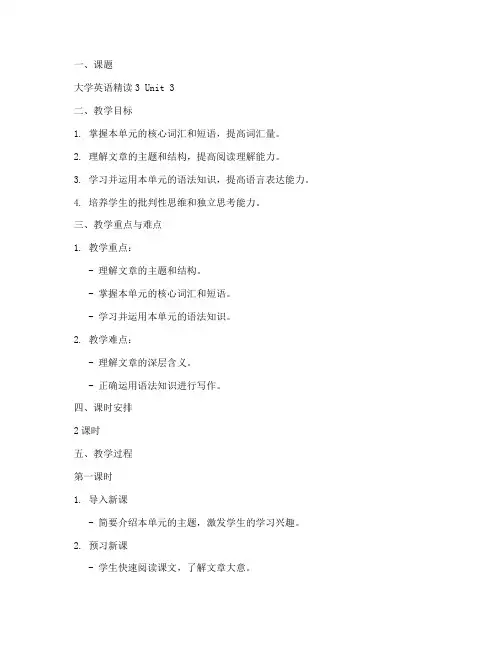
一、课题大学英语精读3 Unit 3二、教学目标1. 掌握本单元的核心词汇和短语,提高词汇量。
2. 理解文章的主题和结构,提高阅读理解能力。
3. 学习并运用本单元的语法知识,提高语言表达能力。
4. 培养学生的批判性思维和独立思考能力。
三、教学重点与难点1. 教学重点:- 理解文章的主题和结构。
- 掌握本单元的核心词汇和短语。
- 学习并运用本单元的语法知识。
2. 教学难点:- 理解文章的深层含义。
- 正确运用语法知识进行写作。
四、课时安排2课时五、教学过程第一课时1. 导入新课- 简要介绍本单元的主题,激发学生的学习兴趣。
2. 预习新课- 学生快速阅读课文,了解文章大意。
3. 词汇教学- 教师讲解本单元的核心词汇和短语,并引导学生进行练习。
4. 阅读理解- 教师引导学生分析文章结构,理解文章主题。
- 学生回答问题,检验阅读理解效果。
5. 语法讲解- 教师讲解本单元的语法知识,并进行示例分析。
6. 练习巩固- 学生进行相关练习,巩固所学知识。
第二课时1. 复习巩固- 学生回顾上节课所学内容,教师进行提问。
2. 语法运用- 学生运用所学语法知识进行写作练习。
3. 课堂讨论- 教师引导学生就文章主题展开讨论,培养学生的批判性思维。
4. 总结归纳- 教师对本单元内容进行总结,强调重点和难点。
5. 作业布置- 布置相关作业,巩固所学知识。
六、教学评价1. 课堂表现:观察学生在课堂上的参与度、回答问题的情况。
2. 作业完成情况:检查学生作业的正确率和完成情况。
3. 考试成绩:通过考试检验学生对本单元知识的掌握程度。
七、教学反思本教案旨在通过多种教学手段,帮助学生掌握大学英语精读3 Unit 3的知识。
在教学过程中,教师应注重激发学生的学习兴趣,培养学生的阅读理解能力和语言表达能力。
同时,关注学生的个体差异,因材施教,提高教学质量。
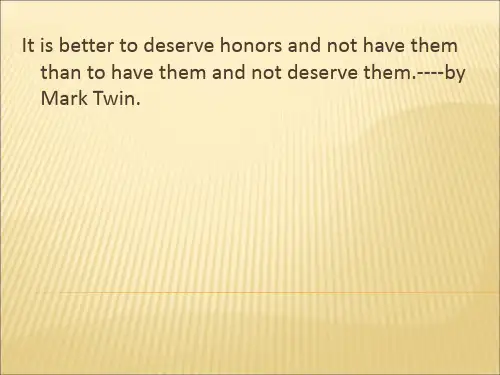
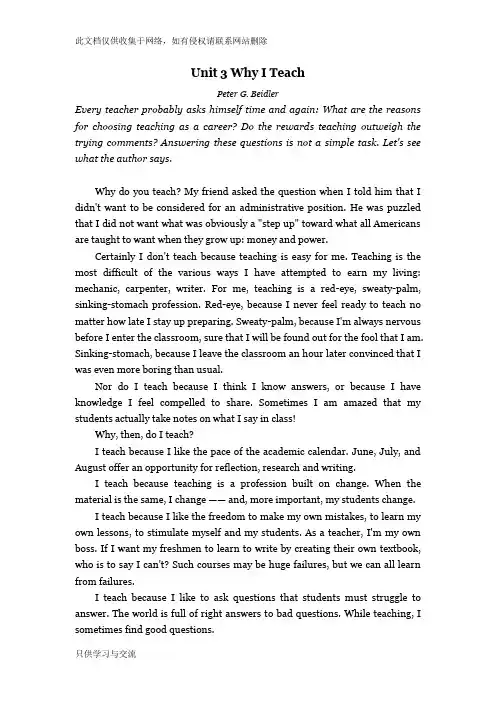
Unit 3 Why I TeachPeter G. BeidlerEvery teacher probably asks himself time and again: What are the reasons for choosing teaching as a career? Do the rewards teaching outweigh the trying comments? Answering these questions is not a simple task. Let's see what the author says.Why do you teach? My friend asked the question when I told him that I didn't want to be considered for an administrative position. He was puzzled that I did not want what was obviously a "step up" toward what all Americans are taught to want when they grow up: money and power.Certainly I don't teach because teaching is easy for me. Teaching is the most difficult of the various ways I have attempted to earn my living: mechanic, carpenter, writer. For me, teaching is a red-eye, sweaty-palm, sinking-stomach profession. Red-eye, because I never feel ready to teach no matter how late I stay up preparing. Sweaty-palm, because I'm always nervous before I enter the classroom, sure that I will be found out for the fool that I am. Sinking-stomach, because I leave the classroom an hour later convinced that I was even more boring than usual.Nor do I teach because I think I know answers, or because I have knowledge I feel compelled to share. Sometimes I am amazed that my students actually take notes on what I say in class!Why, then, do I teach?I teach because I like the pace of the academic calendar. June, July, and August offer an opportunity for reflection, research and writing.I teach because teaching is a profession built on change. When the material is the same, I change —— and, more important, my students change.I teach because I like the freedom to make my own mistakes, to learn my own lessons, to stimulate myself and my students. As a teacher, I'm my own boss. If I want my freshmen to learn to write by creating their own textbook, who is to say I can't? Such courses may be huge failures, but we can all learn from failures.I teach because I like to ask questions that students must struggle to answer. The world is full of right answers to bad questions. While teaching, I sometimes find good questions.I teach because I enjoy finding ways of getting myself and my students out of the ivory tower and into the real world. I once taught a course called "Self-Reliance in a Technological Society." My 15 students read Emerson, Thoreau, and Huxley. They kept diaries. They wrote term papers.But we also set up a corporation, borrowed money, purchased a run-down house and practiced self-reliance by renovating it. At the end of the semester, we would the house, repaid our loan, paid or taxes, and distributed the profits among the group.So teaching gives me pace, and variety, and challenge, and the opportunity to keep on learning.I have left out, however, the most important reasons why I teach.One is Vicky. My first doctoral student, Vicky was an energetic student who labored at her dissertation on a little-known 14th century poet. She wrote articles and sent them off to learned journals. She did it all herself, with an occasional nudge from me. But I was there when she finished her dissertation, learned that her articles were accepted, got a job and won a fellowship to Harvard working on a book developing ideas she'd first had as my student.Another reason is George, who started as an engineering student, then switched to English because he decided he liked people better than things.There is Jeanne, who left college, but was brought back by her classmates because they wanted her to see the end of the self-reliance house project. I was here when she came back. I was there when she told me that she later became interested in the urban poor and went on to become a civil rights lawyer.There is Jacqui, a cleaning woman who knows more by intuition than most of us learn by analysis. Jacqui has decided to finish high school and go to college.These are the real reasons I teach, these people who grow and change in front of me. Being a teacher is being present at the creation, when the clay begins to breathe.A "promotion" out of teaching would give me money and power. But I have money. I get paid to do what I enjoy: reading, talking with people, and asking question like, "What is the point of being rich?"And I have power. I have the power to nudge, to fan sparks, to suggest books, to point out a pathway. What other power matters?But teaching offers something besides money and power: it offers love.Not only the love of learning and of books and ideas, but also the love that a teacher feels for that rare student who walks into a teacher's life and begins to breathe. Perhaps love is the wrong word: magic might be better.I teach because, being around people who are beginning to breathe, I occasionally find myself catching my breath with them.我为何教书你为什么教书呢?当我告诉我的朋友我不想做任何行政职务时,他向我提出了这个问题。
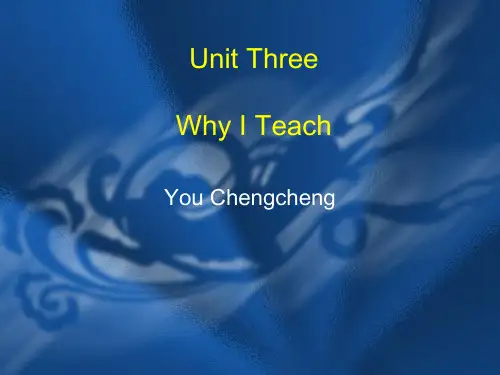
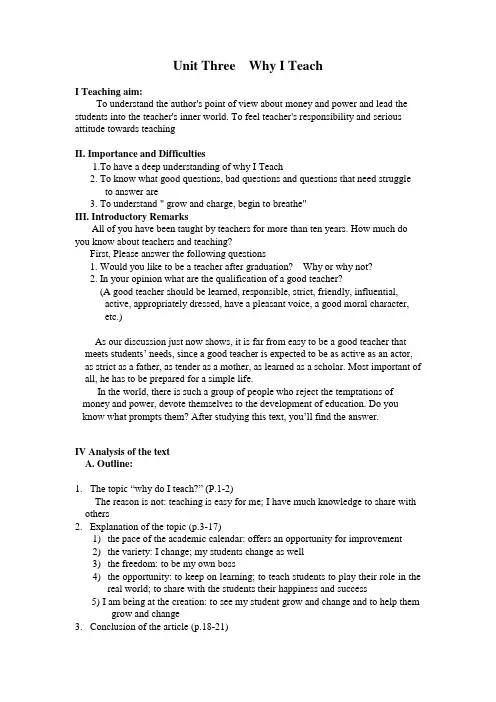
Unit Three Why I TeachI Teaching aim:To understand the author's point of view about money and power and lead the students into the teacher's inner world. To feel teacher's responsibility and serious attitude towards teachingII. Importance and Difficulties1.To have a deep understanding of why I Teach2. To know what good questions, bad questions and questions that need struggleto answer are3. To understand " grow and charge, begin to breathe"III. Introductory RemarksAll of you have been taught by teachers for more than ten years. How much do you know about teachers and teaching?First, Please answer the following questions1. Would you like to be a teacher after graduation? Why or why not?2. In your opinion what are the qualification of a good teacher?(A good teacher should be learned, responsible, strict, friendly, influential,active, appropriately dressed, have a pleasant voice, a good moral character,etc.)As our discussion just now shows, it is far from easy to be a good teacher that meets students’ needs, since a good teacher is expected to be as active as an actor, as strict as a father, as tender as a mother, as learned as a scholar. Most important of all, he has to be prepared for a simple life.In the world, there is such a group of people who reject the temptations of money and power, devote themselves to the development of education. Do you know what prompts them? After studying this text, you’ll find the answer.IV Analysis of the textA. Outline:1.The topic “why do I teach?” (P.1-2)The reason is not: teaching is easy for me; I have much knowledge to share with others2.Explanation of the topic (p.3-17)1)the pace of the academic calendar: offers an opportunity for improvement2)the variety: I change; my students change as well3)the freedom: to be my own boss4)the opportunity: to keep on learning; to teach students to play their role in thereal world; to share with the students their happiness and success5) I am being at the creation: to see my student grow and change and to help themgrow and change3.Conclusion of the article (p.18-21)1)teaching offers its own money and power2)it also offers love and the feeling of remaining young while teachingB.writing style:1.The author uses parallelism of paragraphs to emphasize the reasons he teaches. (Iteach because----I teach because---)2.The professor also uses metaphor to express why he likes teaching professionmore than others.Eg. 1) Being a teacher is being present at the creation, when the clay begins to breathe.2)----getting myself and my students out of the ivory tower-----V. Language points1.puzzle1)vtI was puzzled by the question.His face wore a puzzled expression.2)n.No one has yet succeeded in explaining the puzzle of how life began.It is a puzzle to me how he could come here.2.convince vt. to cause to believe or feel certain ~sb of sth; ~sb. that---Compulsion will never result in convincing them.He convinced me of his sincerity.3.reflection1) a deep and careful thoughtI have a few reflections to offer on what you said.2)an image reflected in a mirror or polished surfacewe looked at the reflection of the bridge in the water.3)the throwing back of heat, light, sound or an imageThe moon looks bright because of the reflection of light.4)sth. that shows the effects of, or is a sign of, a particular condition, etc.This novel is a faithful reflection of what he saw and heard.4.challenge1)n.(1)U sth. with the quality of demanding competitive action, interest, or thoughtThe job is too dull; I want one with more challenge.The government will have to meet the challenge of rising unemployment.(2)C an invitation to compete in fight, match, etc.The prince accepted his enemy’s challenge to a fight.Set phrases: send\give a challenge to sb. meet a challenge be faced with achallenge accept\respond to challenge2)vt.The difficulty challenges my mind to find an answer.I don’t like to study something unless it really challenges me.5.stay up1)not to go t o bed until after the usual timeWe stayed up to watch a film.2)not fall or sinkIf you do fall out of the boat, your lifejacket will help you to stay up until we can fish you out3)remain in a position where it has been hung, mounted, etc.If Jane’s temperature stays up all day, call the doctor.6.find oneself -----When he awake, he found himself in jail.Then I found myself surrounded by half a dozen boysYour remarks were so unexpected that I found myself at a loss for words Concluding remarksNow we can answer the questions we put forward before we began to study the text. What prompts those who reject the temptation of money and power to devote themselves to teaching? It’s the spiritual and intelligent enjoyment of the creation of human beings. Do you respect such professionals?HomeworkWrite a compo sition entitled “ The Ideal Job I Pursue” of about 100 words.1.shift1)vt. Change in position or directionWe have shifted the stress of our work to economic construction.Don’t try to shift the responsibility onto me.2)n. change or take turnsI work on the day\night shift at the factory.2.claim1)declareHe claimed he was innocent.He claimed to have done the work without help.2)ask or demandHe claimed compensation for the loss.You may claim it when you leave here3.be entitled toIf you fail this time, you are not entitled to try any more.I don’t know that he is entitled to special treatment because of his rank.entitle sb. to sth.His high score entitled him to a prize.His rank entitles him to special treatment from the court.entitle: give a name to---He entitled the book “My family”.The book is entitled “Russia Before Revolution”4. at a loss (to do sth..\for sth)The timid girl was at a loss what to say before the crowd.I certainly tried to explain his ideas, but I’m still at a loss to see his po ints.He was at a loss for words to express his disappointment.1.burst into1)enter suddenly; rush intoHe burst into the room, crying.The criminal burst into the house and grabbed me.2)start suddenlyThe girls burst into laughter when they saw that man.When he finished, the crowd burst into thunderous applause.2.hold back1)restrain oneself; checkShe couldn’t hold back her emotions.She holds back her tears with difficulty.2)conceal, keep secretDon’t hold anything back, you must tell me everything.I could tell from his nervousness that he was holding back something.3.in addition\in addition to1)in addition: as wellYou need money and time, and in addition, you need diligence.2)in addition to: as well as, besidesIn addition to the names on the list, there are six other applicants.In addition to teaching English, he teaches German and French.4.It is not long before + clause1)It was not long before + past tenseIt was not long before a helicopter arrived to rescue the survivors of the plane crash.It was not long before we realized our mistake.2)It won’t be long before + present tenseIt won’t be long before he arrives here.5.just that: only thatI’d like to go, just that I have to work.The book is likely to be useful, just that it’s rather expensive。
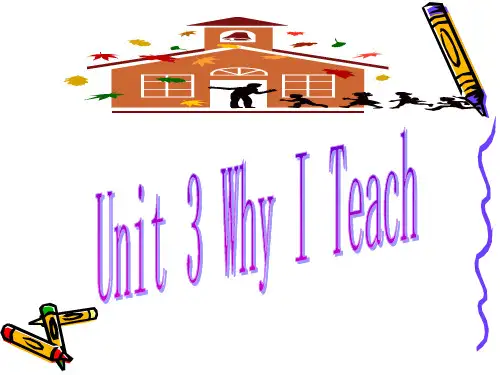
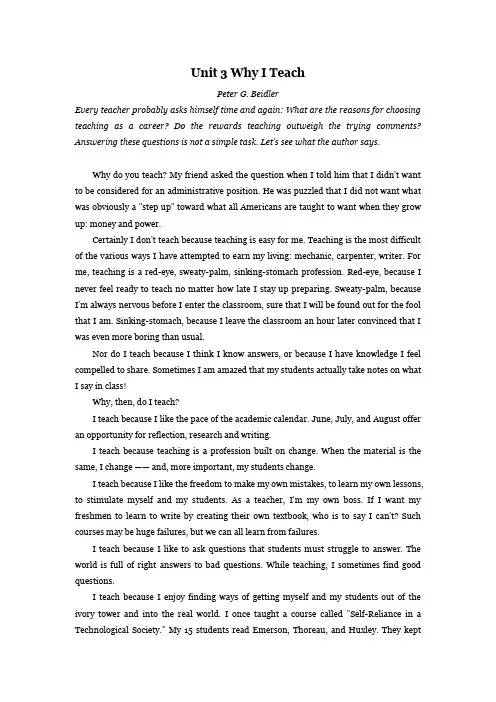
Unit 3 Why I TeachPeter G. BeidlerEvery teacher probably asks himself time and again: What are the reasons for choosing teaching as a career? Do the rewards teaching outweigh the trying comments? Answering these questions is not a simple task. Let's see what the author says.Why do you teach? My friend asked the question when I told him that I didn't want to be considered for an administrative position. He was puzzled that I did not want what was obviously a "step up" toward what all Americans are taught to want when they grow up: money and power.Certainly I don't teach because teaching is easy for me. Teaching is the most difficult of the various ways I have attempted to earn my living: mechanic, carpenter, writer. For me, teaching is a red-eye, sweaty-palm, sinking-stomach profession. Red-eye, because I never feel ready to teach no matter how late I stay up preparing. Sweaty-palm, because I'm always nervous before I enter the classroom, sure that I will be found out for the fool that I am. Sinking-stomach, because I leave the classroom an hour later convinced that I was even more boring than usual.Nor do I teach because I think I know answers, or because I have knowledge I feel compelled to share. Sometimes I am amazed that my students actually take notes on what I say in class!Why, then, do I teach?I teach because I like the pace of the academic calendar. June, July, and August offer an opportunity for reflection, research and writing.I teach because teaching is a profession built on change. When the material is the same, I change —— and, more important, my students change.I teach because I like the freedom to make my own mistakes, to learn my own lessons, to stimulate myself and my students. As a teacher, I'm my own boss. If I want my freshmen to learn to write by creating their own textbook, who is to say I can't? Such courses may be huge failures, but we can all learn from failures.I teach because I like to ask questions that students must struggle to answer. The world is full of right answers to bad questions. While teaching, I sometimes find good questions.I teach because I enjoy finding ways of getting myself and my students out of the ivory tower and into the real world. I once taught a course called "Self-Reliance in a Technological Society." My 15 students read Emerson, Thoreau, and Huxley. They keptdiaries. They wrote term papers.But we also set up a corporation, borrowed money, purchased a run-down house and practiced self-reliance by renovating it. At the end of the semester, we would the house, repaid our loan, paid or taxes, and distributed the profits among the group.So teaching gives me pace, and variety, and challenge, and the opportunity to keep on learning.I have left out, however, the most important reasons why I teach.One is Vicky. My first doctoral student, Vicky was an energetic student who labored at her dissertation on a little-known 14th century poet. She wrote articles and sent them off to learned journals. She did it all herself, with an occasional nudge from me. But I was there when she finished her dissertation, learned that her articles were accepted, got a job and won a fellowship to Harvard working on a book developing ideas she'd first had as my student.Another reason is George, who started as an engineering student, then switched to English because he decided he liked people better than things.There is Jeanne, who left college, but was brought back by her classmates because they wanted her to see the end of the self-reliance house project. I was here when she came back. I was there when she told me that she later became interested in the urban poor and went on to become a civil rights lawyer.There is Jacqui, a cleaning woman who knows more by intuition than most of us learn by analysis. Jacqui has decided to finish high school and go to college.These are the real reasons I teach, these people who grow and change in front of me. Being a teacher is being present at the creation, when the clay begins to breathe.A "promotion" out of teaching would give me money and power. But I have money. I get paid to do what I enjoy: reading, talking with people, and asking question like, "What is the point of being rich?"And I have power. I have the power to nudge, to fan sparks, to suggest books, to point out a pathway. What other power matters?But teaching offers something besides money and power: it offers love. Not only the love of learning and of books and ideas, but also the love that a teacher feels for that rare student who walks into a teacher's life and begins to breathe. Perhaps love is the wrong word: magic might be better.I teach because, being around people who are beginning to breathe, I occasionally find myself catching my breath with them.我为何教书你为什么教书呢?当我告诉我的朋友我不想做任何行政职务时,他向我提出了这个问题。
Unit3WhyITeachPeterG.Beidler Everyteacherprobablyaskshimselftimeandagain:Whatarethereasonsforchoo singteachingasacareer?Dotherewardsteachingoutweighthetryingcomments? Answeringthesequestionsisnotasimpletask.Let'sseewhattheauthorsays.Whydoyouteach?MyfriendaskedthequestionwhenItoldhimthatIdidn'twan ttobeconsideredforanadministrativeposition.HewaspuzzledthatIdidnotwantw hatwasobviouslya"stepup"towardwhatallAmericansaretaughttowantwhenthey growup:moneyandpower.CertainlyIdon'tteachbecauseteachingiseasyforme.Teachingisthemostdiffic ultofthevariouswaysIhaveattemptedtoearnmyliving:mechanic,carpenter,write r.Forme,teachingisared-eye,sweaty-palm,sinking-stomachprofession.Red-eye, becauseIneverfeelreadytoteachnomatterhowlateIstayuppreparing.Sweaty-pal m,becauseI'malwaysnervousbeforeIentertheclassroom,surethatIwillbefoundo utforthefoolthatIam.Sinking-stomach,becauseIleavetheclassroomanhourlaterc onvincedthatIwasevenmoreboringthanusual.NordoIteachbecauseIthinkIknowanswers,orbecauseIhaveknowledgeIfeelc ompelledtoshare.SometimesIamamazedthatmystudentsactuallytakenotesonw hatIsayinclass!Why,then,doIteach?IteachbecauseIlikethepaceoftheacademiccalendar.June,July,andAugustof feranopportunityforreflection,researchandwriting.Iteachbecauseteachingisaprofessionbuiltonchange.Whenthematerialisthe same,Ichange——and,moreimportant,mystudentschange.IteachbecauseIlikethefreedomtomakemyownmistakes,tolearnmyownless ons,tostimulatemyselfandmystudents.Asateacher,I'mmyownboss.IfIwantmyfr eshmentolearntowritebycreatingtheirownteGtbook,whoistosayIcan't?Suchcou rsesmaybehugefailures,butwecanalllearnfromfailures.IteachbecauseIliketoaskquestionsthatstudentsmuststruggletoanswer.The worldisfullofrightanswerstobadquestions.Whileteaching,Isometimesfindgood questions.IteachbecauseIenjoyfindingwaysofgettingmyselfandmystudentsoutoftheiv orytowerandintotherealworld.Ioncetaughtacoursecalled"Self-RelianceinaTech nologicalSociety."My15studentsreadEmerson,Thoreau,andHuGley.Theykeptdi aries.Theywrotetermpapers.Butwealsosetupacorporation,borrowedmoney,purchasedarun-downhouse andpracticedself-reliancebyrenovatingit.Attheendofthesemester,wewouldtheh ouse,repaidourloan,paidortaGes,anddistributedtheprofitsamongthegroup.Soteachinggivesmepace,andvariety,andchallenge,andtheopportunitytokee ponlearning.Ihaveleftout,however,themostimportantreasonswhyIteach.OneisVicky.Myfirstdoctoralstudent,Vickywasanenergeticstudentwholabor edatherdissertationonalittle-known14thcenturypoet.Shewrotearticlesandsentt hemofftolearnedjournals.Shediditallherself,withanoccasionalnudgefromme.B utIwastherewhenshefinishedherdissertation,learnedthatherarticleswereaccept ed,gotajobandwonafellowshiptoHarvardworkingonabookdevelopingideasshe' dfirsthadasmystudent.AnotherreasonisGeorge,whostartedasanengineeringstudent,thenswitched toEnglishbecausehedecidedhelikedpeoplebetterthanthings.ThereisJeanne,wholeftcollege,butwasbroughtbackbyherclassmatesbecaus etheywantedhertoseetheendoftheself-reliancehouseproject.Iwasherewhenshec ameback.Iwastherewhenshetoldmethatshelaterbecameinterestedintheurbanp oorandwentontobecomeacivilrightslawyer.ThereisJacqui,acleaningwomanwhoknowsmorebyintuitionthanmostofusl earnbyanalysis.Jacquihasdecidedtofinishhighschoolandgotocollege.ThesearetherealreasonsIteach,thesepeoplewhogrowandchangeinfrontofm e.Beingateacherisbeingpresentatthecreation,whentheclaybeginstobreathe.A"promotion"outofteachingwouldgivememoneyandpower.ButIhavemone y.IgetpaidtodowhatIenjoy:reading,talkingwithpeople,andaskingquestionlike," Whatisthepointofbeingrich?"AndIhavepower.Ihavethepowertonudge,tofansparks,tosuggestbooks,topoi ntoutapathway.Whatotherpowermatters?Butteachingofferssomethingbesidesmoneyandpower:itofferslove.Notonlyt heloveoflearningandofbooksandideas,butalsothelovethatateacherfeelsforthatr arestudentwhowalksintoateacher'slifeandbeginstobreathe.Perhapsloveisthewr ongword:magicmightbebetter.Iteachbecause,beingaroundpeoplewhoarebeginningtobreathe,Ioccasionall yfindmyselfcatchingmybreathwiththem.我为何教书你为什么教书呢?当我告诉我的朋友我不想做任何行政职务时,他向我提出了这个问题。
Unit1 A Brush With The LawI. Objectives:Students are required to be able to1. grasp the main idea and analyze the structure of the text;2. appreciate the writing skills demonstrated in the text;3. master the key language points and grammatical structures in the text;4. conduct a series of listening, speaking and writing activities related to thetheme of the unit.II. Importance:Word-building: the negative prefixes of “un-” and “counter-” ;III. Difficulties:1. Analysis of some complex sentences;2. Appreciation of the writing skills demonstrated in the text;IV. Teaching methods:1. Multi-media (to display a short video reflecting American law system);2. Blackboard (with detailed explanations and analysis of the text);3. Discussion (to divide students to several groups to discuss the advantages anddisadvantages of law system of America and that of China)V. Teaching-steps:1.Overall impression of the text, including general idea and the textstructure (1 class)To guide students to seize key sentences and factors of a story and to conclude the significance of the text.2. Detailed explanations and analysis of the text (2 classes)1).Leading-in (warm-up questions):a. Have you ever been stopped by the police? If yes, for what? And how didyou feel then?b. Do you think that everyone is equal in the eyes of the law? Explain.c. What do you think of the law system of America and that of China? Statetheir advantages and disadvantages.2).Give a brief introduction of the general idea of the story told in this text.3).Ask students to read through the text and then divide the passage intoseveral parts.4).Learn the passage and give specific analysis and explanations.3. Exercises related to the text, reading activity and guided writing (3classes)1).Ask students to do the exercises before the class, and then check theanswers in class, offering necessary guides and explanations.2).Basic reading skill----How to Use a Dictionary.3).Guided writing.VI. Global analysis and Language points:Key factors and structure:Structure:Cause: (Paras 1--3) I was strolling along the streets.Developing: (Paras 4-16/17-18/19) I was questioned and arrested.-----I wasquestioned and charged.----I was trialedand released.End: (Paras 20-21) One policeman complained.Words and sentences:1. brush: a short fight or quarrel; an argument or disagreement---to have a brush with the police/the Customs men/the enemy---It is his third brush with the law in less than a year.2. take sb. to court: take legal action against sb.---I told him that I would take him to court if he did not repay the money in a week. ---If you go on ill-treating your wife like this, you will be taken to court.3. …it makes a good story now:… it provides material for a g ood story now.Here the verb “to make” means “to have the qualities needed for (sth. good)”. Examples:--- Iced tea makes an excellent drink in summer.--- The wall calendar makes a nice new year gift.4. What makes it rather disturbing was the arbitrary circumstances both of my arrest and my subsequent fate in court:The author was arrested simply because the policemen thought he intended to steal milk bottles and later in court he was released from the charge just because he had the “right” accent, respec table middle-class parents, reliable witnesses and so on. That is to say, he was arrested arbitrarily and released arbitrarily. And it is this arbitrariness of both his arrest and his release that the author thinks rather disturbing.arbitrary: based on on e’s own wishes or will rather than reason--- If a leader makes decisions without conducting investigations, he is being arbitrary.--- The arbitrary decisions of the factory owners caused dissatisfaction among the workers.circumstances: conditions, facts, etc. connected with an event or a person--- We can not expect him to continue these activities under such unfavorable circumstances.--- Because of circumstances beyond our control the meeting was cancelled. subsequent: coming after, followingExamples:--- Subsequent events proved that my judgment of the situation was right.--- The story will be continued in subsequent issues of the magazine.5.… and was not due to go to university until the following October:In Britain the university terms are: October-December; January-March;April-June.due:1) expected or scheduled to arrive or be ready; supposed (to)--- The train from Beijing is due at 1:30.--- The next train to Nanjing is due to leave at ten.--- The young man is due to appear in the Magistrat es’ Court next Monday.2) to be paid or returned--- When is the rent due?--- The books are due today but I want to renew some of them.7.It must have been this obvious aimlessness that led to my downfall.:I’m sure my arrest was the result of my wanderi ng in the streets without any definite purpose.obvious: easy to see or understand; clear---It was obvious that the policeman mistook me for a thief.---For obvious reasons, the magistrate dismissed the case after fifteen minutes. 8. … this time in uniform…:the second policeman was wearing uniform while the first was obviously in plain clothesuniform: a certain type of clothing which all members of a group or organization wear---Policemen wear uniform(s); so do soldiers; postmen and Customs men.---The boys and girls take great pride in wearing school uniforms.9. …I was left in no doubt:I became completely certain of the seriousness of the matter; I realized that it was no joke and they meant business.10.…commit an arrestable offence:…commit an offe nce which is serious enough for one to be arrested commit: do (sth. wrong, bad, foolish, or unlawful)---If we fail to understand this, we shall commit a lot of mistakes.---During their occupation of China, the Japanese invaders committed many horrible crimes against the Chinese people.---The detective concluded that the murder was committed in this very room.---Can you tell us why the gifted American poet committed suicide (killed himself) at the peak of his fame?11.perfectly straight face: a face showing no emotion or humor; a very seriouslooking faceperfectly: very; completely---You’re perfectly right.---I’m perfectly satisfied with your arrangements.12….in the most casual and conversational tone I could manage:…trying to sound as unconcerned and informal as I couldcasual: relaxed and unconcerned about what is happening or what one is doing ---Because of his casual attitude toward work, he was fired.13….it confirmed them in their belief that I was a thoroughly disreputable character:…it reinforced their belief that I was a very disreputable person.confirm:1) strengthen; make firmer--The sudden snowstorm during the night confirmed my decision not to leave.2) prove to be true or correct--The Mayor confirmed the report that his son had been kidnapped.14. ‘Aha,’ I could see them thinking, ‘unemployed’:Judging by the look on their faces, the author realized that the policemen must be reasoning like this: ‘Aha, you’re unemployed. That’s why you are stealing.’The word ‘aha’ is used here to express the satisfaction and joy of the policemen in finding out the “reason” for the young man’s supposed theft.15. Given the obscure nature of the charge…:Considering the obscure nature of the charge…The charge against the narrator—wandering with intent to commit an arrestable offence—was very vague or unclear. The magistrate might find him guilty if he had a criminal record, or the magistrate might find him innocent if he had reliable witnesses to prove his good character.given: considering, if one takes into account--Given their inexperience, they’ve done a good job.VII. Reference books:1. Unit1 of College English Book3 (Teacher’s book).2. Online library (information concerning to American law system).VIII. Homework:Think: What are your suggestions to improve the law environment in China?Unit2 Fruitful QuestionsI. Objectives:Students are required to be able to1. grasp the main idea and structure of the text;2. appreciate the writing skills demonstrated in the text;3. master the key language points and grammatical structures in the text;4. conduct a series of listening, speaking and writing activities related to thetheme of the unit.II. Importance:Word-building: the suf fix of “-eer” (volunteer, engineer, pioneer, etc.) ;III. Difficulties:1. Analysis of some complex sentences;2. To learn to appreciate the writing skills demonstrated in the text;IV. Teaching methods:1. Multi-media (to display a segment of the film “Gone with the wind” reflectingAmerican Civil War);2. Blackboard (with detailed explanations and analysis of the text);3. Discussion (to divide students to several groups to discuss the virtue of ,sometimes, NOT telling truth).V. Teaching-steps:1. New words and phrases of the text (one class)To pay much attention to word-building of the key words and the part of speech, making sentences if necessary.2. Detailed explanations and analysis of the text (2 classes)1). Leading-in (warm-up questions):a. Have you ever told a lie? And why did you do that?b. Do you insist that we should never tell lies or sometimes it’s a kind ofvirtue not to tell the truth? Explain.2). Give a brief introduction of the general idea of the story narrated in thistext.3). Ask students to read through the text and then divide the passage intoseveral parts.4). Learn the passage and give specific analysis and explanations.3. Exercises related to the text, reading activity and guided writing (2classes)1).Ask students to do the exercises before the class, and then check theanswers in class, offering necessary guides and explanations.2).Basic reading skill----Scanning.`3).Guided writing.VI. Language points:1.But I could picture her as she was in the story she told me.:But I could form a picture in my mind of what she looked like in the story she told me.Picture: imagine; form a picture of in the mindExample:--I couldn’t see his face in the dark, but I could somehow picture his expression.2. …in the stained blue uniform…:Blue was the color of the uniforms worn by Union soldiers while the Confederates wore gray uniforms.3. That’s what war is really like, child; no bugles and banners. Just pain and filth, futility and death.:Here Aunt Bettie is saying that war is not so glorious or romantic as some people describe it. In reality it only brings about pain and filth, futility and death.4. 11th Bermont Volunteers:On April 15, 1861, three days after the Confederates fired the first shots of the Civil War, President Lincoln issued his call for 75,000 volunteers. Answering his call, many young people joined the Northern army to “save the Union and free the slaves”and many regiments of volunteers were formed. The 11th Vermont V olunteers means the 11th Regiment of volunteers from the state Vermont.5. …should report the presence of this Union officer to the Confederate army: …should report to the Confederate army that there was a Union officer in her farmhouse.presence: the fact or state of being presentExample:---Jane was so quiet that her presence was hardly noticed.6….James Van Metre’s wife fanned the spark of life that flickered in Henry Bedell:She brought the dying man(Henry Bedell) back to life in the way that she would fan a dying fire into flame again.7. flare up: suddenly become angry, fierce or violent, especially of a person, fire, battle, etc.Example:---I don’t like to see you flare up so easily.8. see that/see to it that: make sure that; take care thatExample:---I promise to see that the fee is paid without delay.9. brush aside: disregard, ignoreExample:---He brushed aside all our objections/suggestions.10. disaster: a great or sudden misfortune; a terrible accidentExample:---Every year throughout the world natural disasters such as earthquakes and volcanic eruptions cause heavy losses of life and property.11. Only an hour from the Union lines:When they came to a place which was only an hour’s drive from the lines of defense of the Union Army, …Here “ an hour” means “ the distance which can be travelled in an hour”.VII. Reference books:1. Unit2 of College English Book3 (Teacher’s book).2. American Novel: Gone with the wind.VIII. Homework:To write a letter (Exercise2 of Guided Writing on page 41 of the student’s book)Unit3 Why I teachI. Objectives:Students are required to be able to1. grasp the main idea and structure of the text;2. appreciate the writing skills demonstrated in the text;3. master the key language points and grammatical structures in the text;4. conduct a series of listening, speaking and writing activities related to thetheme of the unit.II. Importance:Word-building: the prefix “re-” (again or back) and suffix “-ship”(status or condition) ;III. Difficulties:1. Analysis of some complex sentences;2. To learn to appreciate the writing skills demonstrated in the text;IV. Teaching methods:1. Multi-media (to display some pictures of both Chinese and foreign educators);2. Blackboard (with detailed explanations and analysis of the text);3. Discussion (to divide students to several groups to discuss whether they like tobe a teacher in the future)V. Teaching-steps:1. New words and phrases of the text (one class):To pay much attention to word-building and part of speech of the key words and make sentences if necessary.2. Detailed explanations and analysis of the text (2 classes)1).Leading-in (warm-up questions):a. Would you like to be a teacher? Why or why not?b. What do you think are the advantages of being a teacher? What are thedisadvantages?c. What qualities does a good teacher need?2).Give a brief introduction of the general idea of this text.3).Ask students to read through the text and then divide the passage intoseveral parts.4).learn the passage and give specific analysis and explanations.3. Exercises related to the text, reading activity and guided writing (2classes)1).Ask students to do the exercises before the class, and then check theanswers in class, offering necessary guides.2).Basic reading skill----Scanning(2).3).Guided writing.VI. Language points:1. …I didn’t want to be considered for an administrative position:…I didn’t want to be a candidate for an administrative position, such as the president or vice-president of a university, the dean of a college, the chairman ofa department, etc.2. Certainly I don’t teach because teaching is easy for me.:Certainly I teach not because teaching is easy for me.3. teaching is the most difficult of the various ways I have attempted to earn my living: mechanic, carpenter, writer.:I have tried many other ways to make a living. I have worked as a mechanic, a carpenter, a writer, and now I am working as a teacher. Of all these professions, teaching is the most difficult for me.4. For me, teaching is a red-eye, sweaty-palm, sinking-stomach profession.: Teaching is a profession that makes my eyes red for lack of sleep, my palms sweaty because of nervousness and my stomach sinking because I often feel so disappointed with my lectures.Here, “stomach” means “spirit, heart”. A person’s stomach sinks when he is upset, disappointed.profession: job that needs formal qualifications after training, e.g. law, medicine, teaching, acting.Example:---As a sophomore, I still don’t know what profession would suit me best.5. …because I have knowledge I feel compelled to share:…because I have knowledge (that) I feel compelled to share (with my students). compel: make (sb.) do sth. by or as if by forceExample:---Having found himself out of gas, the driver was compelled to walk several miles to the nearest village.6. freshman: a student in the first year of collegesophomore: a student in the second year of collegejunior: a student in the third year of collegesenior: a student in the fourth year of college7. to ask questions that students must struggle to answer:To ask difficult, thought-provoking questions which the students must think hard about before they can answer.8. The world is full of right answers to bad questions:Here “bad questions”means “meaningless questions or simple questions”thateveryone can answer easily.9. I teach because I enjoy finding ways of getting myself and my students out of the ivory tower and into the real world.:Institutions like universities and colleges are often referred to as “ivory towers”where professors and their students study only book knowledge and have little to do with the practice of everyday life. What the author tries to do is to help the students go out of the ivory tower and into the real world, learn to solve practical problems and prepare themselves for the life they will encounter after graduation.10. variety: state of varying; a number of different kinsExample:---My job lacks variety; I am doing the same things all the time.11. But I was there when …:But what was really rewarding was to be there when…12….because he decided the liked people better than things:A student of English studies mainly literature, which reflects man’s life andthought, while an engineering student concerns himself mainly with the marking of things.13. Being a teacher is being present at the creation, when the clay begins tobreath.:According to the Bible, man was created by God out of clay. When God breathed the breath of life into the clay, it became alive and the creation of man was completed. Here the author compares the job of a teacher to the work of God. He implies that the teacher helps the student become a real man or woman.14. What is the point of being rich?: what’s the use of being rich?15. Perhaps love is the wrong word; magic might be better.:Perhaps the word “love”is not sufficient to describe what teaching offers; it might be better to use the word “magic””.VII. Reference books:1. Unit3 of College English Book3 (Teacher’s book);2. Online library (information concerning to American education).VIII. Homework:Think: What are the problems of Chinese current education system? How to improve it?Unit5 The Day Mother CriedI. Objectives:Students are required to be able to1. grasp the main idea and structure of the text;2. appreciate the writing skills demonstrated in the text;3. master the key language points and grammatical structures in the text;4. conduct a series of listening, speaking and writing activities related to thetheme of the unit.II. Importance and difficulties:Word-building: the suffix “-ist”, and blends (motel: motor and hotel);III. Difficulties:1. Analysis of some complex sentences;2. To learn to appreciate the writing skills demonstrated in the text;IV. Teaching methods:1. Multi-media (to display a segment of the film “Forest Gan” reflecting Gan’smother’s love to him);2. Blackboard (with detailed explanations and analysis of the text);3. Talk (to divide students to several groups to tell stories which shows how greattheir mothers are).V. Teaching-steps:1. New words and phrases of the text (one class)To pay much attention to word-building of the key words and make sentences if necessary.2. Detailed explanations and analysis of the text (2 classes)1).Leading-in (warm-up questions):a. When a task defeats you, how do you react?b. How do you comfort someone threatened with losing his or her job?c. What did your parents do to help you get to college?2).Give a brief introduction of the general idea of the story told in this text.3).Ask students to read through the text and then divide the passage intoseveral parts.4).Learn the passage and give specific analysis and explanations.3. Exercises related to the text, reading activity and guided writing (2classes)1).Ask students to do the exercises before the class, and then check theanswers in class, offering necessary guides and explanations.2).Basic reading skill----Understanding Figurative Language3).Guided writing.VI. Language points:1. filled with anticipation: full of expectation; very excited (because he thoughthe could enjoy reading his sports magazine alone at home without anyone to disturb him.)Example:--- As Christmas drew near, the children were filled with anticipation.2. issue: a particular edition of a magazine or newspaperExample:---The latest issue of Time contains a cover story entitled It Came from Outer Space.3. burst into: rush intoExample:--- Andy burst into the classroom, grabbed his books, and rushed out again.4. flipped on a light: turned on a light quickly5. managed a weak smile: managed to give a faint smile; forced a faint smile6. set one’s mind to: give all one’s attention to doing (sth.)Example:---After hearing the sad news, Jack could not set his mind to his work that afternoon.7. assume: take as true without actual proofExample:--- I assume that you agree with what Mary has just said.8. …that didn’t stand in her way:…her having had no training didn’t prevent her from becoming a nursery teacherStand/be in sb’s way: prevent sb. from doing sth.Example:---If you think you can get a better job elsewhere, I’ll certainly not stand in your way.9. qualify: cause sb. to teach the level needed for sth. or to do sth.Example:---This training will qualify you as a computer operator.10. I was not the least bit surprised, or impressed:I was not surprised or impressed at all.(The author felt that way because he thought his mother could do anything and he took her employment by the radio station as a matter of course.)11. help out: give help at a time of need (to sb.)Example:---Our neighbors helped out when Mother became ill.12. on (one’s) guard: watchful; ready to defend or protectExample:--- As the bus was very crowded, the conductor warned the passengers to be on (their) guard against pickpockets.13. You might just remember that she is working primarily so you can go tocollege:You should remember that she is working mainly with the purpose of making it possible for you to go to college.Sometimes, “might”can be used to suggest that a person should do sth, behave in a certain way, etc.Example:---You might at least say “ Thank you” when someone helps you.14. sometime, some time, sometimes:Sometime: at some uncertain or unstated timeExample:---He first came to China sometime around 1932.15. hold back: controlExample:--- Mr. Jackson managed to hold back his anger and avoided a quarrel with his 16-year-old son.16. …something inside me turned: I felt deeply moved.17. She broke then:At that time she could no longer control her emotions.18. …tapping away: tapping on without stopping; tapping continuouslyThe adverb “away” here means “without stopping” or “continuously”Example:---The soldiers fired away until they had no ammunition left.19… there was something more going on in there than a woman learning to type:…besides learning to type, Mother was also showing her determination to overcome whatever difficulties she might meet with, her strong will not to accept defeat easily and her courage to go ahead.20. memento: a small object which reminds one of a holiday, a friend, etc. Example:---These post cards are mementos of their trip to Italy.VII. Reference books:Unit5 of College English Book3 (Teacher’s book).VIII. Homework:Translation: Exercise15 of this unit (on page100).Unit6 A Day’s WaitI. Objectives:Students are required to be able to1. grasp the main idea and structure of the text;2. appreciate the writing skills demonstrated in the text;3. master the key language points and grammatical structures in the text;4. conduct a series of listening, speaking and writing activities related to thetheme of the unit.II. Importance:Word-building: the prefix “therm(o)-”(means heat or temperature), “kilo-”(means one thousand) and “milli- (one thousand of a unit)”;III. Difficulties:1. Analysis of some complex sentences;2. To learn to appreciate the writing skills demonstrated in the text;IV. Teaching methods:1. Multi-media (to display a short video introducing Ernest Heimingway);2. Blackboard (with detailed explanations and analysis of the text);3. Discussion (to divide students to several groups to discuss how to define aHERO)V. Teaching-steps:1. New words and phrases of the text (one class)To pay much attention to word-building of the key words and make sentences if necessary.2. Detailed explanations and analysis of the text (2 classes)1).Leading-in (warm-up questions):a. Have you ever been in the face of danger or even death? If yes, how didyou react?b. Have you ever been worried by what somebody said only to find out laterthat you had misunderstood and that there was nothing to worry about atall?2).Give a brief introduction of the general idea of the story told in this text.3).Ask students to read through the text and then answer the question:What does the title mean (A day’s wait)? And what has happened to the child?4).Learn the passage and give specific analysis and explanations.3. Exercises related to the text, reading activity and guided writing (2classes)1).Ask students to do the exercises before the class, and then check theanswers in class, offering necessary guides and explanations.2).Basic reading skill----Increasing Word Power.3).Guided writing.VI. Language points:1. shiver: shake or tremble, esp. from cold or fearExample:---The shopping-bag lady stood at the street corner shivering all with cold. 2….looking a very sick and miserable boy of nine years:…looking, despite what he said, very ill and unhappy and young and vulnerable 3. instruction: clear and detailed informationExample:---Read the attached book carefully and follow the instructions when you set the washing machine to work.4. …and seemed very detached from what was going on:The boy showed little interest in what was happening, because, as we learn later, he was thinking about his death.5. “Just the same, so far,” he said:Here the boy may mean “I’m still alive up to now, though I’m going to die.”6. (would) rather: more willinglyExample:---I would rather go today than tomorrow.7. prescribe: order to give (sth.) as medicine or treatment for a sick personExample:---What medicine did the doctor prescribe for your illness>8. … a high clay bank with overhanging brush:… a small clay cliff with bushes, weeds, and branches hanging over the edge 9. scatter: go off in all directionsExample:---The birds scattered at the sound of the gun.10. they made difficult shooting: they were very difficult to shootmore Example:---His handwriting made difficult reading.11. You mustn’t get what I have:You mustn’t catch the illness I have.12. something like: about, approximatelyExample:---Every day he walked something like two miles to school.13. take it easy: don’t worry; don’t hurry; don’t get excited or anxious。
UNIT 1:A Brush with the LawAnd so I do not have a criminal record. But what was most shocking at the time was the things my release from the charge so clearly depended on. I had the 'right' accent, respectable middle-class parents in court, reliable witnesses, and I could obviously afford a very good solicitor. Given the obscure nature of the charge, I feel sure that it I had come from a different background, and had really been unemployed, there is every chance that I would have been found guilty. While asking for costs to be awarded, my solicitor's case quite obviously revolved around the fact that I had a 'brilliant academic record'.所以我就没有了犯罪记录。
但当时,非常令人震惊的是宣布我无罪所明显依赖的事实。
即我操着标准的口音,我受人敬重的中产阶级的父母到了法庭,我有可靠的证人,并且看得出我能请得起一位很好的律师。
想到这次起诉时那种莫明其妙的做法,我敢肯定如果我出生于另一种背景的家庭,并真正是失了业,那很有可能我被判为有罪。
unit3 why I teachREAD WORDSintuitition 直觉 analysis分析clay粘土spark 火花pathway path magic 魔术;魔力catch one’s breathREAD TEXTT here is Jacqui, a cleaning woman who knows more by intuition than most of us learn by analysis. Jacqui has decidedto finish high school and go to college.”there is…analysis.”There is Jacqui,这已经是一句完整的句子了,则逗号之后的句子是appositive clause来修饰Jacqui。
A woman who 则又是一个attributive clause.意思是一个通过直觉来认知地比我们更多的女士。
I have the power to nudge,to fan sparks,to suggest books,to oint out a pathway.动词不定式作宾语补足语修饰 power. Word Intuition n.1.直觉;直观2.直觉感知的事;直觉真理;直觉知识3.直觉力;敏锐的洞察力by intuition 凭直觉have a intuition 有种感觉1.I had an intuition that we would find then there.我突然有种直觉我们能在那里找到他们。
2.Intuition told me you are here.我凭直觉知道你在这儿。
I have the power to nudge,to fan sparks,to suggest books,to oint out a pathway.动词不定式作宾语补足语修饰 power. Analysis复数形式:analysesv.analyse/analyze与其相似变化的词:basis-bases-baseparalysis 麻痹-paralyses-paralyse/paralyze 使麻痹 1.分析 2.分解 3.分析结果表,分析报告4.要略;梗概;纲领短语:in the final(或last, ultimate)analysis 总之,归根到底,说到底,结果,毕竟These are the real reasons I teach, these people who grow and change in front me. Being a teacher is begins present at the creation, when the clay beginsto breathe.”These are…in front me”这些是我缘何执教的真正原因,为的是这些在我面前成长和变化的人这两句话分别都是用了attributive clause来修饰reason和people.A "promotion" out of teaching would give me money and power. But I have m oney. I get paid to do what I enjoy: reading talking with people, and askin g questions like, "What is the point of being rich?"get paid to do what I enjoy 我通过做我喜欢的事情来得到报酬。